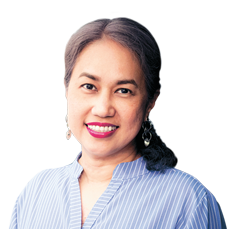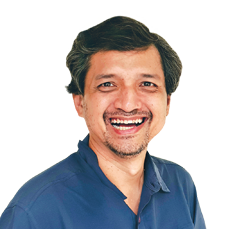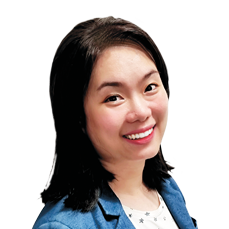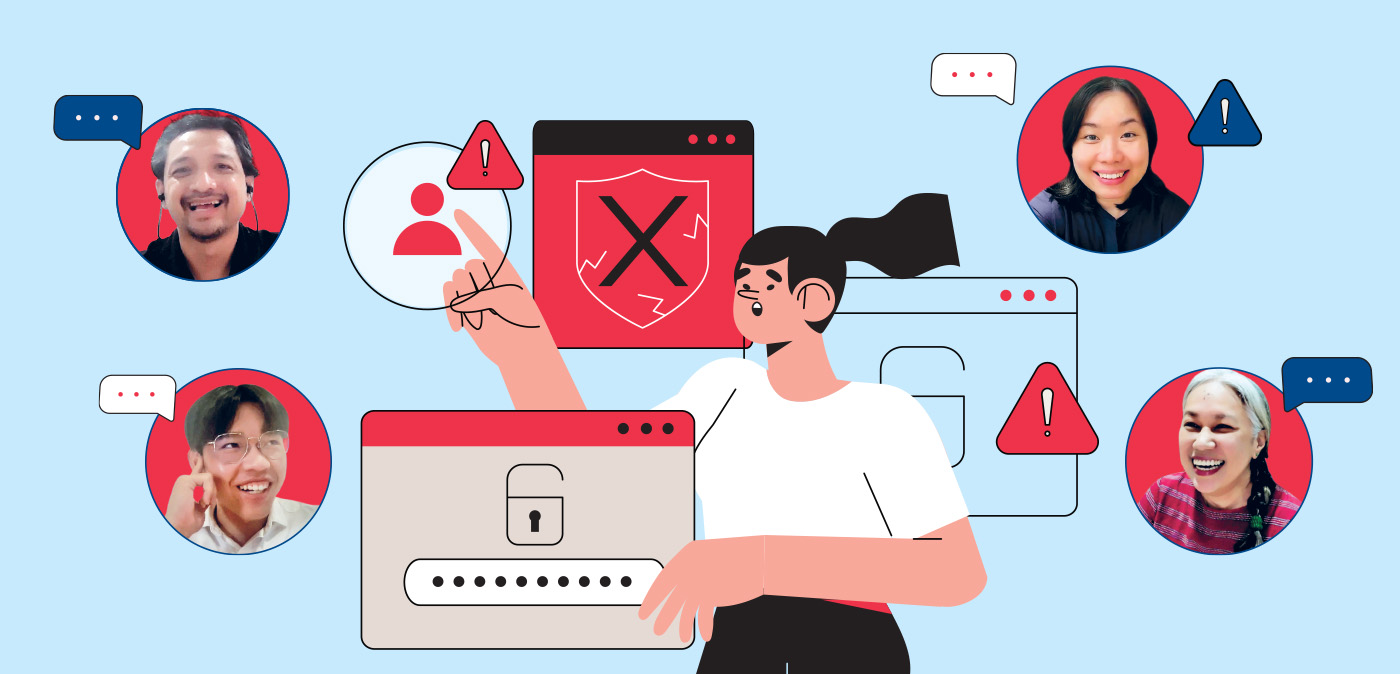Living in a Digital World: The Good, The Bad And The Ugly
Does it always pay to be plugged-in, logged-on and virtual-ready, or is our ongoing tryst with technology a double-edged sword? Which aspects of digital adoption work well and which need to be relooked? Our contributors weigh in.
As A Meta Of Fact
You don’t have to be a savvy investor in cryptocurrency and metaverse real estate to be a digital citizen. You are one, as long as you use digital tools and interact with others online — a fact that is true of some 5 billion people, or 63% of the global population. What are the perks and dangers of this new world, how do we navigate it safely, and what are our roles and responsibilities?
OUR PANEL

Ms Lim Swee Kim
(Computing ’88)
Finance and Administration for a Sports Federation; Chairperson of Raffles Hall Association

Mr Benedict Loo
Year 2 Undergraduate
College of Humanities and Sciences

Mr Johann Annuar
(Engineering ’02)
Founder of a tech social enterprise

Ms Polly Lim Pei Ching
(Systems Sciences ’11)
Tech company manager; founder of a tech social enterprise
The COVID-19 pandemic has accelerated digital transformation in almost all aspects of our lives. While it has brought many conveniences, it has also resulted in many dangers — from online scams to falling prey to fake news. What do you think are the biggest pitfalls?
Swee Kim: I have been working in technology since the 1980s. Even in the early days, we encountered people who would abuse it for dishonest deeds — such as using expensive office equipment and facilities to access unsavoury content online. This is even more widespread in the present, given that the Internet is such a big part of our lives. This was especially evident during the height of the pandemic last year, when many were stuck at home and turned to the computer and other digital devices for work, entertainment and socialising. This access to a vast amount of information and a wider spectrum of people increases the individual’s exposure in many ways. And given that evil is always lurking around — both in real life and in the virtual space — it is necessary for people to be able to identify those with nefarious intentions.
Benedict: The proliferation of technology and the Internet has grown at an exponential rate. This also means that the exposure to risk of users adopting these different tools and platforms has increased. It’s not about how comfortable and tech-savvy you are. Although my generation grew up with tech, I too fell prey to a phishing scam and lost about US$500 worth of items that I traded on a gaming platform. That happened was when I was in my teens. Two or three of my friends also fell victim to phishing scams. Thankfully, I don’t see people of my age falling prey to such scams anymore. But back then, as children who enjoyed playing games online, we were taught the skills to use various digital tools by either our parents or schools — but not about Internet hygiene and how to use it safely.
Polly: Since 2015, I have been running a social enterprise that teaches seniors how to use smartphones — and I do find that they have become a lot savvier. In our initial classes, maybe only two out of 20 attendees would be using WhatsApp; now, every participant uses WhatsApp and Facebook. However, it isn’t just the users who have become savvier — the crooks have also upped their game and always seem a step ahead, be it in proliferating fake news or luring people with scams. Beyond teaching (seniors) how to use the technology, we also need to educate them to not be too trusting when interacting with others online, especially when they are buying things.
![]()
There is a lot of concern about political powers weaponising social media, and I do see political propaganda being fed to me through these platforms. This is worrying, as the users of platforms such as TikTok tend to be very young and impressionable.
Mr Benedict Loo
Benedict: I recently helped to draft a response to The Straits Times with regards to the spread of misinformation on TikTok. There is a lot of concern about political powers weaponising social media, and I do see political propaganda being fed to me through these platforms. This is worrying, as the users of platforms such as TikTok tend to be very young and impressionable.
Johann: I have been running a social enterprise that provides laptops to underprivileged school-going kids. While we have done a lot of work in this area — and garnered a lot of support to give vulnerable families the infrastructure and equipment to access the Internet — there is still much to be done. One of our top priorities is to talk to these children about the risks of the Internet. As a nation, we can consider ourselves ‘lucky’ to have this problem, because it suggests that most people here possess some level of understanding of the online space. This is not universally true for people in other countries. The fact remains that a lot of people still don’t understand what computer literacy, or even phone literacy, is. There are whole communities out there with no access to the digital world, and the problem they face is a very different one: that of a digital divide. To me, it would be a bigger problem if we allow the divide between the ‘Haves’ and the ‘Have-Nots’ to widen. Digitalisation has become such an important part of society — from how we perform daily tasks to the kind of jobs available — that it is neither reasonable nor responsible for us as members of society to allow anybody to fall through the cracks and be cut off from it.
So building a better digital world is not just about how we conduct ourselves online, but offline as well?
Benedict: I find it appalling that individuals are pouring billions into the metaverse when there are people starving in real life. It shows how we, as a society, have become desensitised. As technology develops, it is our responsibility to define who we are as people and members of a community.
Swee Kim: As members of society, we should recognise our privilege — from being able to leverage digital transformation to our personal advantage, to being able to have a university education. Our position of privilege makes it our responsibility to make the world a better place. Don’t just be a spectator – get involved! While the percentage of Singaporeans who need help with access to the Internet today is probably less than 5%, there is still the issue of guidance, especially for children. There are parents who are unable to spend time navigating the digital world with their children, and one way to address this issue is through community support. For example, we are now redefining our libraries as community spaces for people to socialise and bring up the young, and these vulnerable children might be able to get guidance when they access the Internet through these public facilities. There is also the matter of balance: every individual needs to have several communities supporting and informing him or her. These can span from family members and relatives to colleagues and schoolmates, and extend to friends from interest groups.
Benedict: This is a very good point, especially since one big concern about the content one gets through various digital platforms is the strength of the algorithm. Everybody has their own confirmation biases, and you end up seeing more of what you want to see. That can be very dangerous, especially if one is at the receiving end of fake news. Finding communities within the digital world to have meaningful conversations with and hear other viewpoints is very important. We also need to assess how much of our interpersonal relationships are built online, versus in real life. Anecdotally, I hear about young parents who are concerned about their children’s social development and behaviour because they spend so much time online rather than interacting with their peers in real life.
Polly: That balance is a challenge not just for young users. While some remain sceptical and hesitant to go online, certain seniors are completely glued to their handphones. While being able to stay connected with friends and family online has been a big advantage — especially at the height of the pandemic when many restrictions on gatherings were in place — being active online could also lead to physical inactivity. We’ve noticed many seniors who have lost some degree of mobility over the course of the last two years. My 83-year-old mum stayed home for much of that time for fear of contracting COVID-19. While she has become adept at interacting with friends and family online, we now encourage her to go out for fresh air or meet friends through special interest groups.


Scam victims in Singapore lost a total of 633.3 MILLION in 2021
Source: The Straits Times
Is balance possible to achieve, given that technology is now part and parcel of almost every aspect of our daily lives? Do you go on a digital detox?
Swee Kim: I make sure my digital devices are three metres away from me when I go to bed.
I don’t want signals frying my brain!
Johann: Digital detoxing to me is about taking a break away from your device rather than not allowing your brain to be fried. But it can be challenging: these days, you can leave your house without your wallet, but not without your phone!
Benedict: A lot of people my age clock double digits of screen hours every day, and they find it difficult to be away from their phone or devices. Technology is there from the moment we wake up; we use it for work, and when we rest, we watch a show on Netflix or scroll through social media. I conscientiously go offline for an hour before sleep each day, just to detach myself from the onslaught of information from online sources, and to allow time for reflection and introspection. Studies have shown that this promotes better sleep too. However, to live life completely offline would be impossible!
Swee Kim: While so much of our lives are conducted online, there is the possibility that we could be stripped of technology one day, in times of unrest and strife. So we still need the ability to be able to do things without being totally dependent on technology.

Global Internet Protocol traffic in 2022 – domestic and international – is expected to exceed all Internet traffic up to 2016.
Source: UNCTAD Digital Economy Report 2021
Johann: There is a stigma about how tech threatens to take over our lives and how we need to guard against it. But technology is nothing but a tool — one that’s no different from pens and pencils, or even clothes that protect our modesty and say who we are! When we started Engineering Good in 2014, it was to leverage technology to provide those with disabilities with a more inclusive life, such as through speech-to-text applications, or something as simple as Google Maps to find their way around. It is up to us to decide how to use these tools — and I think all of us should spend some time disconnected from technology to ponder that question. It’s not just our phones, but also step-trackers, TraceTogether tokens, smartwatches… devices that store and share a lot of information about who you are, what you do, which KTV you like the best (Laughs)… More people should have full awareness of what each piece of gadgetry does before running out to get it!
![]()
While so much of our lives are conducted online, there is the possibility that we could be stripped of technology one day, in times of unrest and strife. So we still need the ability to be able to do things without being totally dependent on technology.
Ms Lim Swee Kim

An estimated 70% of new value created in the economy over the next decade will be based on digitally-enabled platform business models.
Source: World Economic Forum
What to you are the biggest benefits of widespread digital transformation?
Polly: Convenience — from buying groceries online to working from home, even for those in high-security industries such as banking.
Benedict: Access to information. I can now go onto an online learning platform like Coursera and explore a topic totally unrelated to my studies. It has fundamentally given us access to whatever information we want at whichever point in time. Technology can also transcend physical boundaries: for example, I continued to conduct tuition classes for my students during the circuit-breaker, thanks to video conferencing technology.
Swee Kim: I also work with the Global Esports Federation and we have meetings with people from America, Australia, the Middle East and Europe. Despite the time difference and physical distance between us, we are able to meet and align goals. In that respect, technology has brought about invaluable benefits. Technology has also created many new career opportunities for a younger generation.
Johann: The Web allows us all to participate as global citizens, to care about the things that are happening around the world rather than just minding our own backyard. And communications technology also allows you to be part of a lot of conversations while fulfilling other responsibilities. To illustrate: I’m doing this forum discussion in my car, while driving to pick up my daughter from fencing, collecting a cake for a birthday celebration, and now sending my wife somewhere else! There are many things in life that you want to be present for, and technology allows us to do more with our time and with our lives.
Polly: It can certainly bring the world closer, but if we over-indulge in it, it could tear us apart. It goes back, once again, to the point about balance — so that our digital life does not take over everything.